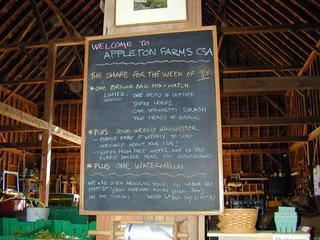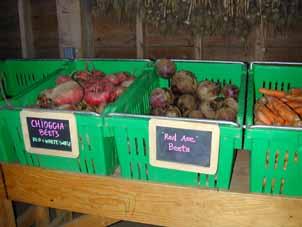
Appleton Farms CSA
As the farm season draws to a close in New England, I face share pick up day with a measure of impending dread. Soon it will be back to the supermarket for trucked and flown-in vegetables. No more picking through bins of freshly picked greens, eggplants, squashes and Brussels sprouts. No more personally harvested tomatillos, bright red chili peppers or fragrant bunches of herbs. I spent the weekend in a cooking frenzy using what I can while I still have it. I feel like the squirrels I see racing across the streets stashing nuts before the first snows.

The impending winter looms bleak, but I’m already looking forward to next year. You see, I’m a member of Appleton Farm’s CSA program and going to the farm is a weekly routine throughout the growing season. What is a CSA program? It stands for Community Supported Agriculture. In a trend that is growing (no pun intended) across America, farms are selling a seasonal share of their produce to consumers. This program creates a reliable market for a local farmer while providing shareholders with a steady stream of truly farm fresh fruits and vegetables. By buying their share at the start of the year, shareholders provide capital and guaranteed income to the farmer. The emphasis is on the word share. In this arrangement, shareholders share both the risks and rewards. If a crop fails, your share is small or no existent. If the season is perfect, there is extra for everyone. Given the vagaries of nature with weather and an assortment of pests, nothing can be taken for granted. But the variety of produce is so large that, no matter what the conditions, something (more likely, many things!) is thriving.

Preserving local farms is a truly worthwhile endeavor with many benefits for all involved. It provides local employment and maintains a natural style of life that is lost in the world of industrial farms. It connects us and our children with the earth and how vegetables are actually grown. Children discover that carrots aren’t naturally cut up in plastic bags and the fresh ones are very sweet and actually taste carrots. Sustainable, organic practices are used, enriching the soil while protecting the environment and our bodies from pesticides and other toxins. And it preserves for future generations land that might otherwise be lost to development.

But the best reward is the most selfish. It’s the food! The quality, variety and freshness of the produce are unmatched. Since everything is local and shares are picked up on the spot, the farm has the luxury of picking when things are perfectly ripe and of using heirloom varieties of produce (another preservation of the past benefit!) that are grown for taste rather than their ability to withstand cross-country shipment and days if not weeks of storage. Supermarket produce doesn’t even come close. Since the produce is seasonal, you find yourself adjusting your diet to incorporate what is at its peak at a given moment. In June, you eat strawberries, peas, lettuces, assorted greens, radishes and salad turnips. By August, you are on eggplants, tomatoes, sweet corn and melons. Now, you are roasting root vegetables and squashes while finishing up cauliflower, Brussels sprouts and broccoli. Many of the recipes that have and will appear in the blog are inspired by these wonderful choices.

I’ve been a shareholder for four years now (since Appleton Farms started its CSA program) and each year brings its own surprises. I love going to the farm each week to pick up my share and to walk in the fields for the “pick your own” produce. I’m endlessly fascinated on how each variety of produce has “vintages” and how those vintages are different for each type of fruit and vegetable. For example, the dryness of this summer was tough on spinach and held back sizes and yields for some crops, yet the melons were spectacularly flavorful, as are the winter squashes. The tomato harvest seemed a touch smaller and shorter than previous seasons (but still abundant in the way that only tomatoes and zucchini can be!) But the flavor was strong and the cherry tomatoes were the sweetest yet. Garlic was spectacular the first year, a little disappointing in years two and three, and is again near its peak. If I was the Robert Parker of garlic (now that is one scary thought), I’d rate the garlic vintages 95+, 78, 84, and 90 respectively, and rave about the dedication of Jenny and Bruce and their team of garlic growing artisans.

About Appleton Farms
One of the properties preserved by The Trustees of the Reservations in Massachusetts, Appleton Farms is one of the oldest continuously operating farms in the United States. Located at the border of Hamilton and Ipswich, it was established in 1638 as a land grant to Samuel Appleton and donated to the Trustees by the Appleton family in parcels from 1970 to 1998. A goal of the Trustees has been to keep the property operating as a working farm. The CSA program was established in 2002 and has been growing steadily, supporting about 400 shareholders this year as well as donating produce to local food banks. A crew of dedicated farmers (Jenny and Bruce!), interns and volunteers keep the production going, working the fields and running the distribution barn. A separate dairy operation was started over the past couple of years and plans include also raising some beef cattle (a return to a historical offering from Appleton Farms). Some day, a share may also include farm made cheese and beef!
Joining a CSA Program
If you are lucky enough to live near Appleton Farms, you can apply to join its CSA program. Contact Jenny through the Trustees' web site. If not, don’t despair; there may be a CSA near you. You can search the web for “community sponsored agriculture” or “community supported agriculture” (both names are used) or go to the nifty Alternative Farming Systems Information Site, which is sponsored in part by the USDA. A share price is typically comparable to buying the same quantity of food from a supermarket, but the quality difference is incomparable!

0 Comments:
Post a Comment
<< Home